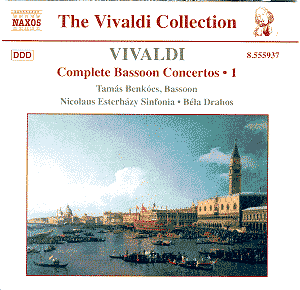Although Vivaldi was
a virtuoso violinist and wrote the massive
total of 253 concertos for the solo
violin, he was able to compose imaginatively
and expertly for a wide range of instruments,
writing an impressive corpus which numbered
545 concertos at my last count.
Vivaldiís remarkably
large number of 39 bassoon concertos
is by far the largest single contribution
to the instrumentís repertoire and more
than he wrote for any instrument other
than the violin. In addition Vivaldi
composed another 34 concertos that included
the bassoon in combination with other
solo instruments. Exactly why Vivaldi
wrote so many solo concertos for an
instrument that rarely takes the limelight
is unclear but it is not unreasonable
to believe that Vivaldi had a gifted
bassoon virtuoso in mind. It is known
that at the Pio Osedale della Pieta
the bassoon was played and it is possible
that one of the girls had a particular
talent that inspired the composer. However
it is much more likely that Vivaldi
was commissioned to write for the bassoon
by a wealthy German patron for his court
orchestra. In this he would undoubtedly
have been following the fashion of the
day for collecting Italian music and
taking it back to Germany.
These seven bassoon
concertos selected by Naxos for volume
1 easily demonstrate proof of Vivaldiís
durability and consistent inventiveness
in writing for the genre. Each of the
concertos adheres to the composerís
typical three movement Allegro-Largo-Allegro
format with bountiful and original episodes
of rhythm, harmony and melody. It is
the slow movements that make the deepest
impression for me. I marvel at Vivaldiís
genius for consistently delivering expression,
charm and depth.
Although we are not
told, the Nicolaus Esterhazy Sinfonia
under the experienced direction of Bela
Drahos and bassoon soloist Tamas Benkocs
sound as if they are using modern manufactured
instruments. Generally I favour performances
using period instruments however this
present disc shows is a most successful
approach from all the Hungarian forces
providing worthy and distinctive interpretations.
Those listeners who consider the bassoon
to be of only limited appeal will surely
think twice after hearing these expressive
performances. Benkocs is a gifted soloist
who demonstrates amazing breath control
and proudly maintains the tradition
of stellar Hungarian wind playing. He
breathes life into every single note
revealing himself as a master of the
harsh technical and challenging interpretative
requirements of Vivaldiís late baroque
music-making. The Nicolaus Esterhazy
Sinfonia impress under Bela Drahos giving
committed and characterful performances.
The main rival for
Vivaldi bassoon concertos is the complete
set from the English Chamber Orchestra
under Philip Ledger and the Zagreb Soloists
under Tonko Ninic with Daniel Smith
as soloist on ASV CDDCX 625 (6) which
has many favourable attributes This
first volume in a projected cycle of
the complete bassoon concertos from
the Naxos wins convincingly on virtuosity,
style and character and augurs well
for the remainder. Another concerto
could have been easily accommodated
on this disc. Naxos are not alone in
seemingly preferring about an hour of
music on their discs.
This is a most satisfying
disc of music that will undoubtedly
reward. Highly recommendable and one
is left eager to hear the forthcoming
volumes.
Michael Cookson
